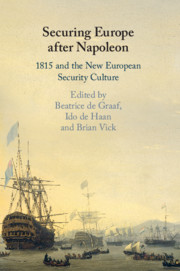Book contents
- Securing Europe after Napoleon
- Securing Europe after Napoleon
- Copyright page
- Contents
- Contributors
- Vienna 1815
- Part I Conceptualisations
- Part II Institutions and Interests
- Part III Threats
- Part IV Agents and Practices
- 13 Friedrich von Gentz and His Wallachian Correspondents
- 14 Diplomats as Power Brokers
- 15 Economic Insecurity, ‘Securities’ and a European Security Culture after the Napoleonic Wars
- Index
15 - Economic Insecurity, ‘Securities’ and a European Security Culture after the Napoleonic Wars
from Part IV - Agents and Practices
Published online by Cambridge University Press: 25 January 2019
- Securing Europe after Napoleon
- Securing Europe after Napoleon
- Copyright page
- Contents
- Contributors
- Vienna 1815
- Part I Conceptualisations
- Part II Institutions and Interests
- Part III Threats
- Part IV Agents and Practices
- 13 Friedrich von Gentz and His Wallachian Correspondents
- 14 Diplomats as Power Brokers
- 15 Economic Insecurity, ‘Securities’ and a European Security Culture after the Napoleonic Wars
- Index
Summary
Economic developments have long shaped what we think of as the main themes of global as well as national history, from the story of capitalism and the industrial revolution, to the age of empires-cum-nations. Yet peacemaking at the end of the Napoleonic wars brought onto the international scene financiers, rentiers, and bankers, funding the future of Europe. Their presence was indicative of the emergence of a new capitalist economic order shaped by industrialisation and imperialism. This chapter uses a focus on this rising class as a lens through which to survey the social and ideological influence of shifting economic relations, practices and identities on the politics of peacemaking and on political agendas, from their impact on foreign policies and questions of ‘security’, to the proposals for political consideration brought to the peacemakers by Benjamin Constant, Saint-Simon, and Robert Owen.
Keywords
- Type
- Chapter
- Information
- Securing Europe after Napoleon1815 and the New European Security Culture, pp. 288 - 305Publisher: Cambridge University PressPrint publication year: 2019
- 2
- Cited by

